 The
School of Peacemaking and Media Technology in Central Asia announces an annual competition
among students from Kyrgyzstan, Kazakhstan, Uzbekistan, Tajikistan, studying journalism and
mass communication, law, cultural studies and anthropology, to participate in
research and media monitoring projects.
The
School of Peacemaking and Media Technology in Central Asia announces an annual competition
among students from Kyrgyzstan, Kazakhstan, Uzbekistan, Tajikistan, studying journalism and
mass communication, law, cultural studies and anthropology, to participate in
research and media monitoring projects.
Over the past six years, about 80 students have completed research internships.
This internship is scheduled for the period from December 15, 2023 to January 25,
2024.
In some cases, a student can start an internship earlier.
The internship will be carried out in a distance format or offline.
The selected interns will be trained in new analytical tools, will have access to databases
and, together with the team, will conduct a few studies.
Participation in the project is a good practice, upon completion of which an internship
confirmation letter will be issued. An important criterion for selecting interns is language proficiency, perseverance, attentiveness, a clear application of methodology and indicators in practice, a desire to work with large amounts of information.
Topics for research this year:
Freedom of expression in the conflict time
Media хenophobia and hate speech (focused on local countries context)
Media and conflict
Information wars and geopolitics
A motivation letter and a CV including the contacts of at least two referees should be sent to peacemakingandmediaca@gmail.com until 18:00 Bishkek time, December 6, 2023 marked "For internship".
Applications sent after this deadline will not be considered. The team does not comment on
the selection methods and does not respond to letters of inquiry after the end
of the call.
About the organization:The School of Peacemaking and Media Technology in Central Asia is a media
development, peace communications and freedom of expression organization focused on countering hate speech, discrimination in the media, on the Internet and public discourse.
Our vision statement aims at encouraging diversity, human rights, peace fair journalism access to information and citizens making informed opinions as a means of promoting a tolerant society.
Since 2011, the School of Peacemaking and Media Technology in Central Asia has implemented nearly 20 programs focused on these activities.
How to counter aggressive communications on the Internet and what is the difference between cyberbullying and other forms of online aggression? Judges of the Supreme Court of Kazakhstan in Astana were trained in new tools developed by the School of Peacekeeping and Media Technology.
Inga Sikorskayia, media trainer and head of the School of Peacemaking, conducted several practical sessions in which 30 judges and court workers took part offline in the Supreme Court and 250 participants from regional Kazakhstan courts online.
The participants were learned effective strategies and gained valuable knowledge and skills that will help them communicate effectively. While working in teams, those present used real cases and, based on tools, were trained to manage aggressive communication.
The training was organized by the judicial administration together with the Legal Media Center with the support of the OSCE Program Office in Astana.
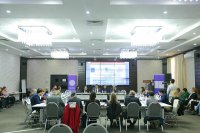 The School of Peacemaking and
Media Technology participated in a
mid-term briefing on the implementation of the Universal Periodic Review (UPR)
for Kyrgyzstan.
The School of Peacemaking and
Media Technology participated in a
mid-term briefing on the implementation of the Universal Periodic Review (UPR)
for Kyrgyzstan.
The Universal Periodic Review (UPR) is a unique mechanism of the Human Rights Council that calls on all UN member states to undergo an expert assessment of their human rights situation every four and a half years.
The event was organized by the Bir Duino Human Rights Movement - Kyrgyzstan with the support of the Regional Office of the United Nations High Commissioner for Human Rights (OHCHR) for Central Asia. Representatives of international organizations, development agencies and the diplomatic corps took part in the mid-term briefing.
The School of Peacemaking and Media Technology (SPMT) has been participating in the review of the recommendation’s implementation in the field of freedom of expression and safety of journalists in Kyrgyzstan for the past three years.
Inga Sikorskaia, SPMT’s director, presented at the panel discussion an analysis of the implementation. 13 countries made 15 recommendations to Kyrgyzstan on freedom of expression issues.
" 10% have been fully implemented, 30% has been partially implemented, and 60% of the comments have not yet been implemented”,- pointed Sikorskaia. She also explained what the authorities should do to improve the situation as quickly as possible. For example, repeal legislative initiatives restricting freedom of expression, ensure consultation with civil society and media professionals on any future legislative initiatives, and refrain from adopting any restrictions that are inconsistent with the requirements of necessity and proportionality in Article 19(3) of the ICCPR.
 Pressure on media
freedom in Central Asia will continue, says Inga Sikorskaya, founder of the
School of Peacemaking and Media Technology in Central Asia.
Pressure on media
freedom in Central Asia will continue, says Inga Sikorskaya, founder of the
School of Peacemaking and Media Technology in Central Asia.
"The rejection of criticism by the authorities creates narratives hostile to the media and fuels negativity society's attitude towards the media, she emphasized at the international conference "Turning Points in Eurasia: Geopolitics, Economics and Civil Society in Central Asia - Current Situation and Future Prospects,” held in Almaty, Kazahstan.
The authorities of Central Asian countries are passing repressive laws against the media. There has been an increase in attacks and threats against media workers. Moreover, attacks using legal mechanisms predominate.
Another example of the suppression of media freedom is organized actions involving unknown groups of people. For example, in Kyrgyzstan, groups of aggressive people came to the local editorial office of Radio Liberty (Azattyk), online media Kloop and Kaktus. The crowd demanded that these media be immediately closed and declared foreign agents (like to the repressive law of Russia). Otherwise, these "activists” threatened that they would burn down the editorial offices.
You can watch the videohere
 The report showsthe attacks/threats
against professional and civilian media workers, and editorial offices of
traditional and online publications. These were identified and analysed in the
course of the research for 2022.Data for the research, carried out over
the course of 2022, was collected using open source content in three languages:
Kyrgyz, Russian and English.
The report showsthe attacks/threats
against professional and civilian media workers, and editorial offices of
traditional and online publications. These were identified and analysed in the
course of the research for 2022.Data for the research, carried out over
the course of 2022, was collected using open source content in three languages:
Kyrgyz, Russian and English.
In 2022, authorities carried out unprecedented numbers of attacks on freedom of speech, partly in response to journalists’ ongoing investigations into corruption in Kyrgyzstan. Since 2021, the number of incidents has tripled.
1. Attacks via judicial and/or economic means remain the main method of exerting pressure on media workers, accounting for 70% of the total number of incidents.
2. There was a sharp increase in the number of journalists being arrested, interrogated, and tried in court as a result of their work.
3. In addition to this, the number of cyber attacks against both media outlets and journalists almost tripled.
4. In addition to this, the number of cyber attacks against both media outlets and journalists almost tripled.
The full report can be viewedhere
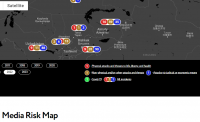 Authorities and society should make efforts to keep
independent media existing in Kyrgyzstan. Therefore, any attempts to toughen
control over media and censor content should be abandoned in the first place.
Authorities and society should make efforts to keep
independent media existing in Kyrgyzstan. Therefore, any attempts to toughen
control over media and censor content should be abandoned in the first place.
The trends demonstrate that the freedom of speech gets worse in the last five years
Experts of the School of
Peacemaking and Media Technology emphasise that dynamics of risks of journalist
activity has changed considerably in five years. 17 incidents against media
workers were reported in 2018, 49 incidents in 2019, 102 incidents in 2020. Their
number declined to 44 in 2021, and the number of attacks increased
significantly in 2022.
According to analysis and documentation of attacks/threats against media workers in Kyrgyzstan, 130 incidents were reported in 2022[1], which is three times more than last year.
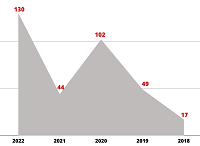 Chart 1. Dynamics
of reported attacks and threats from 2018 to 2022
Chart 1. Dynamics
of reported attacks and threats from 2018 to 2022
Legal mechanisms are used as the key method of pressure on journalists, bloggers and media workers.
In 2022, the number of detentions, arrests, questionings increased as a result of publications in the media, as well as the number of calls of journalists and bloggers for interviews as witnesses.
Threats and online attacks like trolling, bullying, cyber-attacks, including during live broadcasting on social media, are the risks for media workers.
Professional activity and safety of investigative journalists, who shed light on corruption, cover other sensitive topics and demonstrate opposing views in their reports, are at serious risk.
The criminal case against investigative journalist Bolot Temirov and his deportation from Kyrgyzstan last year, arrest and criminal case against blogger Yrys Zhekshenaliev and similar cases confirm these concerns.
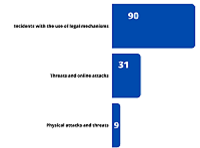 Chart 2. Number of incidents reported in 2022 by categories Blocking of
websites of Azattyk Media, ResPublica, attempted blocking of the website of the
news agency 24.kg in 2022 on formal grounds, based on the law "On fake (false)
information” is the result of the legislation expanding the powers of
authorities to have control over the media landscape.
Chart 2. Number of incidents reported in 2022 by categories Blocking of
websites of Azattyk Media, ResPublica, attempted blocking of the website of the
news agency 24.kg in 2022 on formal grounds, based on the law "On fake (false)
information” is the result of the legislation expanding the powers of
authorities to have control over the media landscape.
The new draft law "On mass media” brought up for public discussion contains such risks. It requires re-registration of all media outlets, imposes restrictions on funding from abroad, and provides for sanctions for unclear "abuse of freedom of speech.”
On the World Press Freedom Day, we demand that the authorities encourage independent journalism, pluralism, diversity of media and abandon pressure on this fundamental human right.
[1] Ongoing monitoring, analysis and documentation of incidents and media risks are held by experts of School of Peacemaking and Media Technologyin CA and Justice for Journalists Foundation, 2017 -2023, https://jfj.fund/risk-map/
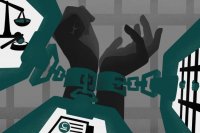 Identity disclosure, blackmailing, persecutions,
violation of privacy right, and forced emigration accompany the actions of
activists, who are in the high-risk area due to their human rights activities.
Identity disclosure, blackmailing, persecutions,
violation of privacy right, and forced emigration accompany the actions of
activists, who are in the high-risk area due to their human rights activities.
An LGBTQ+ activist (no name is given for security reasons) working in an NGO as a foreign specialist was blackmailed in Bishkek by people who identified themselves as police officers.
They showed him a screenshot of a private video, where he was captured with another man.
‘Police officers’ demanded that the activist should cooperate with them and deliver information on his colleagues upon their request. In case of denial, he was threatened with spreading this video among his acquaintances, relatives and across the country.
In fear of persecutions, the victim of blackmail left Kyrgyzstan. But when some months later he tried to get back, he failed. He was shown a document confirming he was denied entry at the border point. The document was endorsed by GKNB (State Committee for National Security of the Kyrgyz Republic). The reason for denial was not specified.
In addition to blackmail and pressure, the victim was restricted in his freedom of movement.
Despite the fact that article 29 of the Constitution of the Kyrgyz Republic ensures everyone "right to privacy”, this right of the activist was breached. Moreover, it was breached based on his sexual orientation, citizenship and human rights activity.
Another case of disclosure of SOGI (note: sexual orientation and gender identity) and private life details was published in a video about "KyrgyzIndigo”, an LGBT organization of the Kyrgyz Republic.
The video contained information and personal data of employees, their addresses and photos.
"After this information was disclosed, some employees of the NGO were spied on by unknown persons,” wrote activistsin their report "Violence and discrimination against LGBTQ+ people in the Kyrgyz Republic”[1].
Previously, Kyrgyzstan-based human rights activists had also reported cases when personal data were publicly disclosed and posed a risk for life.
Activists cite another case when during the 2020 parliamentary election in Kyrgyzstan an intimate video of two men filmed on a hidden camera was posted on the internet.
The video disclosed their names, sexual orientation, places of study and work. Victims of discrimination reported that the provocative video was published after they were blackmailed by people who identified themselves as "police officers.” According to the victims, they were demanded to disclose information about LGBTQ+ activists and human rights defenders.
"In recent years, there have been increasing incidents when LGBTQ+ activists are used for political purposes and their private life becomes public,” said Nadira Masyumova, representative of the Coalition for Equality of Kyrgyzstan. "But the state does not respond to these cases.” Analyzing these cases, Masyumova emphasized that there "are serious concerns about complicity of public servants in such cases.”
Another visible part of the LGBTQ+ community is trans* people who often become targets of media. A transgender is a man or woman, whose gender identity is different from the sex they were assigned at birth. For example, a person was assigned female at birth, and was brought up and educated as a female, but feels oneself as a male and wants to live and socialize as a male.
Several cases were documented when trans*people in bars, on the streets were filmed and their personal data were disclosed. And such cases were usually followed by physical assaults outdoors.
According to activists, only one case can be an inspiring example for LGBTQ+ people.
A trans*woman has managed to win the honour and dignity case in court against the media outlet that spread hate against her and revealed her personal information. The court awarded compensation to her in the amount of 10,000 Kyrgyz soms (115 USD dollars). However, she had to leave Kyrgyzstan for safety reasons.
This article was prepared under the project "Promoting media freedom and diversity through reporting on violation of rights and training of media workers in creating sensitive media reports on minority and marginalized groups” with the support of the Canada Fund for Local Initiative (CFLI).
[1] The shadow report was written by this NGO for the 136th session of the UN Human Rights Committee, 2022.
 Attempts to introduce inclusion into schools have faced risks from bureaucracy to violation of rights and lack of safe psychological environment.
Attempts to introduce inclusion into schools have faced risks from bureaucracy to violation of rights and lack of safe psychological environment.
13-year-old Nazira (not her real name) uses hearing aid that help her to better understand the world around. In early childhood, the girl had a hearing implant surgery to compensate her hearing loss.
From grade one, she studied in the special boarding school for hearing impaired children of Bishkek as she was not admitted to regular schools because of her disability. Five years later, Nazira’s mother decided to improve her development.
"I needed to place my daughter into a speaking environment,” mother said. "There [in the special school], they taught her only finger spelling [a special form of communication that used fingers – note] and sign language as there was no speaking environment.”
Nazira’s parents found a boarding school in Bishkek not far from their house. This was a secondary school of general education for orphans and children left without parental care. She was taken there for a probationary period of three months and was put into grade four for better adaptation, although she studied in grade six by that time.
Nazira’s mother was in constant contact with teachers, was interested in her daughter’s integration into the new environment, her successes in school. The teachers answered positively to all her questions.
But one case changed everything: once Nazira dodged lessons and did not return to school for a while. She was searched by parents, teachers, police. When she came home late at night, the psychological condition of the teenager was critical.
According to Nazira, her classmates laughed at her because of her hearing issues and discussed her hearing aid and disability loudly. Girl was shocked by it and could not stay in school anymore.
After the parents asked the administration to explain the incident, they learned that there was decided to suspend the girl for missing lessons. Moreover, the teachers advised taking Nazira to the special boarding school, where she had studied before.
The three laws of Kyrgyzstan ensure access to inclusive education for children with disabilities: "On education and science”, "On preschool education”, and "On rights and guarantees of persons with disabilities”. Inclusion means a form of study when all children study together regardless of their development peculiarities, level of their abilities, and diagnoses.
According to the National Statistical Committee as of March 2021, there are over 32 thousand children with disabilities under 18 in Kyrgyzstan or 1.3 per cent of total number of children of this age group. And only 10 per cent of these 32 thousand children study in special schools.
In 2019, Kyrgyzstan also ratified the International Convention on the Rights of Persons with Disabilities and the Inclusive Education Development Programme for 2019 to 2023.
However, the specialist point at a range of problems hindering inclusion in schools.
"Many funds together with the Ministry of Education and Science of the Kyrgyz Republic developed standards, methods, individual plans and even pilot projects,” said Almaz Tazhybai, director of the Centre for State Policy Analysis, which studies the enforcement of laws in educational sphere. "But [the Programme] is not yet introduced because of bureaucracy, lack of political will and allegedly because there is no money in the budget.”
Tazhybai cited other cases of violation of children’s and their parents’ rights to inclusion as an example. "Special boards established in every district send children with disabilities to special boarding schools that enrol [children] with references from the ministry of health,” he said.
Many parents want their children to study in schools with others and to have an opportunity to choose a facility of their own choice.
Another problem is the lack of psychologically safe environment in schools of general education. The case with Nazira confirms it. In school, where she tried to study, there was no special child psychologist who can work with disabled children, and teachers failed to integrate Nazira into common school environment.
Bullying by classmates and stigma have almost pushed the hearing-impaired girl to suicide.
"After that case, my daughter wanted to jump down the balcony, I could hardly talk her out of this,” Nazira’s mother said crying.
This article was prepared under the "Promoting media freedom and diversity through reporting on violation of rights and training of media workers in creating sensitive media reports on minority and marginalized groups project” with the financial support of the Canada Fund for Local Initiative (CFLI).
![]() Opponents of Kyrgyz independent
media must stop speaking because local audience prefer objective and diverse
information, while media outlets serve public interests.
Opponents of Kyrgyz independent
media must stop speaking because local audience prefer objective and diverse
information, while media outlets serve public interests.
It’s due to independent media and journalists that Kyrgyzstan is still on best positions in international rankings[1], leaving all Central Asian states and many other states in the ex-Soviet area behind.
Attempts made by some groups who organised the protest in Bishkek demanding to close independent media outlets are against the constitution.
They breach article 10 of the Constitution of the Kyrgyz Republic, in particular regarding the statement that "media outlets are free and carry out their operations according to the law.”
The protest was held on October 13, 2022 in front of the Radio Azattyk office in Bishkek[2].
Moreover, the protest was organised amid consideration of the regular report by Kyrgyzstan on observation of the International Covenant on Civil and Political Rights submitted to the UN Human Rights Committee, which takes place this day.
An underhand initiative of deputies on countering independent media outlets and their demands of their closure are nothing else but attempts to escalate the situation in society.
Parliamentarian Dastan Bekeshev confirmed the fact of collection of signatures for closure of independent media outlets in his Telegram channel.
The School of Peacemaking and Media Technology in CA expresses its utmost concern about the fact that such actions intend to distract people’s attention from the current socio-political agenda and serious issues in Kyrgyzstan.
Use of the long-time leverage against independent media, setting them against society can have negative consequences.
We urge legislators, the government and organisers of similar actions to stop manipulating by independent media and to immediately respond to the threats voiced against media groups.
Attacks on the media and media workers increase every year in Kyrgyzstan.
According to the annual report of the School of Peacemaking and Media Technology in CA and the Justice for Journalists Foundation, the number of incidents against media has increased almost three times in the last five years in the country.
[1]https://rsf.org/en/index
[2]https://24.kg/proisshestvija/247941_vbishkeke_vozle_ofisa_azattyika_prohodit_miting_trebuyut_zakryit_smi/


The School of Peacemaking and Media Technology in Central Asia announces an annual competition among students from Kyrgyzstan, Kazakhstan,…

25 journalists and media workers from various regions of Kyrgyzstan have been trained to counter the propaganda of violent extremism and hate in…